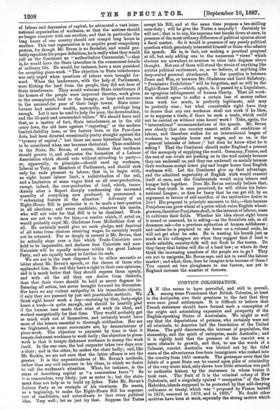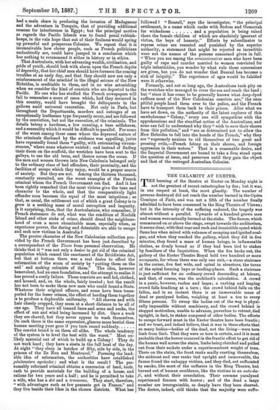CONVICT COLONISATION.
AN idea seems to have prevailed, and still to prevail, among some Frenchmen that British Colonies, at least in the Antipodes, owe their greatness to the fact that they were once penal settlements. It is difficult to believe that French statesmen should have formed such a conception of the origin and astonishing expansion and prosperity of the English-speaking States of Australasia. We might as well say that the deportations of persons, who certainly were not all criminals, to America laid the foundation of the United States. The gold discoveries, the increase of population, the steamship, and the spirit of enterprise, made Australia ; and it is rightly held that the presence of the convict was a mere obstacle to growth, and that, to use the words of a Colonist, convict Australia was blotted out by the tidal wave of the adventurous free-born immigrants who rushed into the country from 1851 onwards. The grotesque error that the fabric of a great State can be reared upon piles of criminality of the very worst kind, only shows how little attention was paid to authentic history by the statesmen in whose brains it took root. The fruit of it is the criminal colony of New Caledonia, and a singularly cynical " occupation " of the New Hebrides, islands supposed to be protected by that self-denying ordinance or treaty, which was " proposed by France herself in 1878, renewed in 1879, and in 1883." No doubt other motives have been at work, especially the strong motive which
had a main share in producing the invasion of Madagascar and the adventure in Tonquin, that of providing additional reasons for interference in Egypt ; but the principal motive as regards the Pacific Islands was to found penal rubbish- heaps, in the vain hope that out of their foulness would spring up powerful and prosperous Colonies. We repeat that it is inconceivable how clever people, such as French politicians undoubtedly are, could have jumped to a conclusion which has nothing to recommend it either in history or in ethics.
That Australasia, with her advancing wealth, civilisation, and pride of youth, should look with alarm upon the French depfits of depravity, that her chief men should have foreseen the coming troubles at an early day, and that they should now see only a reinforcement of the mischief in the illegal seizure of the New Hebrides, is creditable to them, and in no wise astonishing when we consider the kind of convicts who are deported to the Pacific. No one who has studied the French newspapers will fail to remember a score of cases which, had they occurred in this country, would have brought the delinquents to the gallows amid universal execration. Not only in Paris, but throughout the Departments, murders and outrages of an exceptionally loathsome type frequently occur, and are followed by the conviction, but not the execution, of the criminals. The details betray a hardness, a low cunning, a base selfishness, and a sensuality which it would be difficult to parallel. For some of the worst among these cases where the depraved nature of the criminals disclosed by the evidence was appalling, juries have repeatedly found them "guilty, with extenuating circum- stances," where none whatever existed ; and instead of finding their doom on the scaffold, the wretches have been sent to the galleys, to use the old term, and thence across the ocean. If the men and women thrown into New Caledonia belonged only to the ordinary class of bad offenders, their proximity, and the facilities of escape which they enjoy, would be a proper source of anxiety. But they are not. Among the thirteen thousand, constantly recruited, are the worst examples of the French criminal whom the French Government can find. And it has been rightly remarked that the most vicious give the tone and character to the whole, and that the comparatively light offender soon becomes the equal of the most iniquitous ; so that, as usual, the settlement out of which a great Colony is to grow is a seething mass of moral corruption and impurity. Is it surprising, then, that the Australasians, who remember, if French statesmen do not, what was the condition of Norfolk Island and other sinks of crime, should dread the neighbour- hood of even a more abominable mass, especially when, as experience proves, the daring and detestable are able to escape and seek new victims in Australia ?
The precise character of the New Caledonian collection pro- vided by the French Government has been just described by a correspondent of the Times from personal observation. He thinks that it "was not only a desire to get rid of the criminal population which caused the enactment of the Recidivists Act, but that at bottom there was a real desire to effect the reformation of the scum of society by ' putting them on the soil' and making colonists of them." The idea, however benevolent, had no sure foundation, and the attempt to realise it has proved a costly failure. These convicts are well fed, clothed, and housed, and, on the whole, fairly treated ; but the result has not been to make them new men who could found a State. Whatever their original offence, and some have been trans- ported for the lesser crimes, the effect of herding them together is to produce a deplorable uniformity. "All shaven and with hair closely cropped, they seem at a short distance to be all of one age. They have all tanned faces and arms and necks, the effect of sun and wind being increased by dirt. Once a week they are shaved, but they never appear to wash themselves On each there is the same expression, glances more bestial than human meeting your gaze if you turn round suddenly The convict brand is on them all alike. The whole tendency of the system is to level the best with the worst." Most un- likely material out of which to build up a Colony They do not work hard ; they have a siesta in the full heat of the day. At night "they sleep in batches of fifty, side by side, in the prisons of the Ile Non and Montravel." Pursuing the laud- able idea of reformation, the authorities have established pinitenciers agricol e ; and what is the result? The pre- sumably reformed criminal obtains a concession of land, tools, cash to provide materials for the building of a house, and rations for two years and a half ; and he is permitted to take a wife, who has a dot and a trousseau. They start, therefore, " with advantages such as few peasants get in France," and they live beside their likes in the chosen districts. What has followed " Bewail,' says the investigator, " the principal settlement, is a name which ranks with Sodom and Gomorrah for wickedness and a population is being raised there the female children of which are absolutely ignorant of virtue, the boys of honesty." Efforts by subordinates to repress crime are resented and punished by the superior authority, a statement that might be rejected as incredible were not the names of the persons concerned given in full. " When you see among the concessionaires men who have been guilty of rape and murder married to women convicted for triple infanticides, you wonder by what rule these concessions are given, but you do not wonder that Bourail has become a sink of iniquity." The experience of ages would be falsified were it otherwise.
Formerly, and not so long ago, the Australians took pity on the wretches who managed to cross the sea and reach the land ; but " since it has come to be generally known what deep-dyed ruffians most of the New Caledonian convicts are," the once pitiful people hand them over to the police, and the French have to transport them back to their prison. After what we have set down, on the authority of the latest explorer of this unwholesome " Colony," every one will sympathise with the apprehensions and the steadfast action of the Australians, and none can fail to understand why they " wish to save their shores from this pollution," and "are so determined not to allow the New Hebrides to fall into the hands of the French," why they are "supremely anxious to rid themselves of two great and pressing evils,—French felony on their shores, and foreign aggression in their waters." That is a reasonable desire, and the Imperial Government are bound to take a firm stand upon the question at issue, and persevere until they gain the object and that of the outraged Australian Colonies.



































 Previous page
Previous page